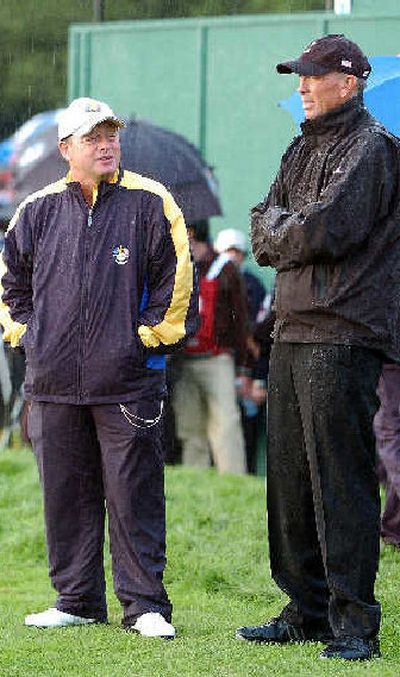Another U.S. captain may sink with ship

STRAFFAN, Ireland – The reputations of Ryder Cup captains are made on decisions like these. Hal Sutton found that out two years ago when his ill-advised pairing of Tiger Woods and Phil Mickelson imploded and took the U.S. team down with it.
Sutton took his licking and rode off in the sunset to his Texas ranch, barely to be heard from again. That’s the kind of fate that can befall a Ryder Cup captain who doesn’t uphold the golfing pride of his country.
Tom Lehman still has two days to salvage his reputation as a handler of fine golf talent. This Ryder Cup is barely eight matches old, and there is a weekend of golf left to be played.
It’s never too early, though, to let the second-guessing begin.
There was plenty of it to go around Friday when an American captain who spent two years studying his players and analyzing his pairings was outmaneuvered by a Welshman who goes by instinct and seems quite comfortable figuring out his pairings while sitting on a bar stool.
Ian Woosnam didn’t even try to come up with a plan until Wednesday, and even then it wasn’t terribly complicated. He would play all 12 players on the first day, see how things were going, and go from there.
Turns out things went pretty well. So well that Woosnam’s lineup not only gave every one of his players some valuable first-day experience, but also a 5-3 European lead after a round each of better-ball and alternate-shot play.
“You just want to get it right, and we got it right on the first day,” Woosnam said.
Unfortunately for the Americans, Lehman didn’t. If Woosnam’s slogan was “Let Them Play,” Lehman’s might have been “Stay the Course.”
The U.S. coach seemed locked into a mind-set he was unwilling – or unable – to change. Even when the morning matches gave him every reason to do just that, Lehman stuck to the formula he had coming in.
Which means that if Mickelson and Chris DiMarco can’t win a match together today and Woods and Jim Furyk can’t team up to make some putts, the Americans will almost surely be heading home without the little gold chalice they flew all the way over here to get.
“It’s still anybody’s ballgame,” Lehman insisted. “I don’t really feel too concerned, but we are a little frustrated.”
Lehman has reason to be concerned. Not just with the play of his team – which on the whole wasn’t all that bad – but with the way he is lining them up.
Mickelson hasn’t played competitive golf in nearly a month and doesn’t have a great match play reputation. Yet after he and DiMarco lost in the opening better ball to Darren Clarke and Lee Westwood, what did Lehman do?
He put them out again in the afternoon alternate shot, where they lost a 1-up lead with one hole to play and managed just a tie against Westwood and Colin Montgomerie. Not only that, he sat down rookie J.J. Henry, arguably the hottest member of the U.S. team with five birdies in his morning match.
That made Mickelson 1-6-1 in his last eight Ryder Cup matches, a statistic that apparently impressed Lehman so much he penciled Lefty and DiMarco in again for today’s better ball against Sergio Garcia and Jose Maria Olazabal.
“I really liked the teams we sent out today. Everybody on our team liked the teams we sent out today,” Lehman said. “I’m going to like the teams we send out tomorrow, too.”
One of those teams will be Woods and Furyk, who, like Mickelson and DiMarco, will be paired for the third straight time. Furyk was widely hailed coming in as the perfect Ryder Cup partner for Woods because he is competitive, drives the ball straight and thrives under pressure.
He showed none of those qualities in the afternoon alternate shot. Furyk began that match by hitting his drive next to a tree that forced Woods to play left-handed, and ended it when he duck-hooked a shot into the water on the 18th hole that sunk any chance the Americans had of tying the match.
Ryder Cup captains don’t have long to stake claims to their legacies. For most, it’s one match and they’re out, leaving it to the often harsh eye of history to judge how they handled the three days of competition. The clock is already running for Lehman, and the same can be said about the chances for the U.S. team.